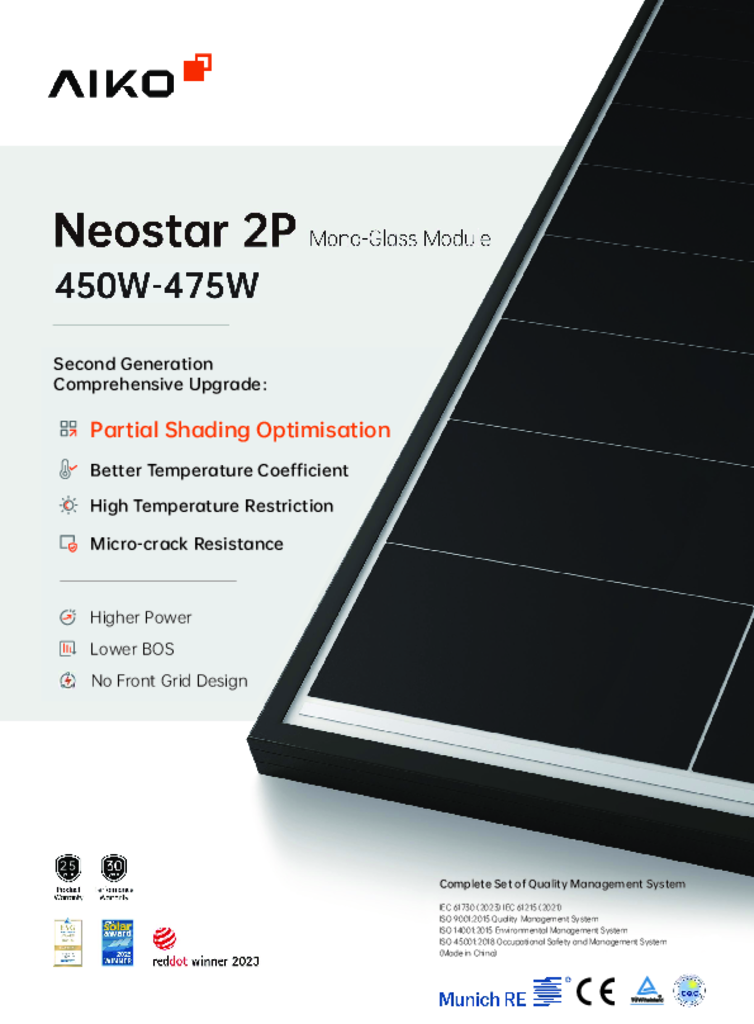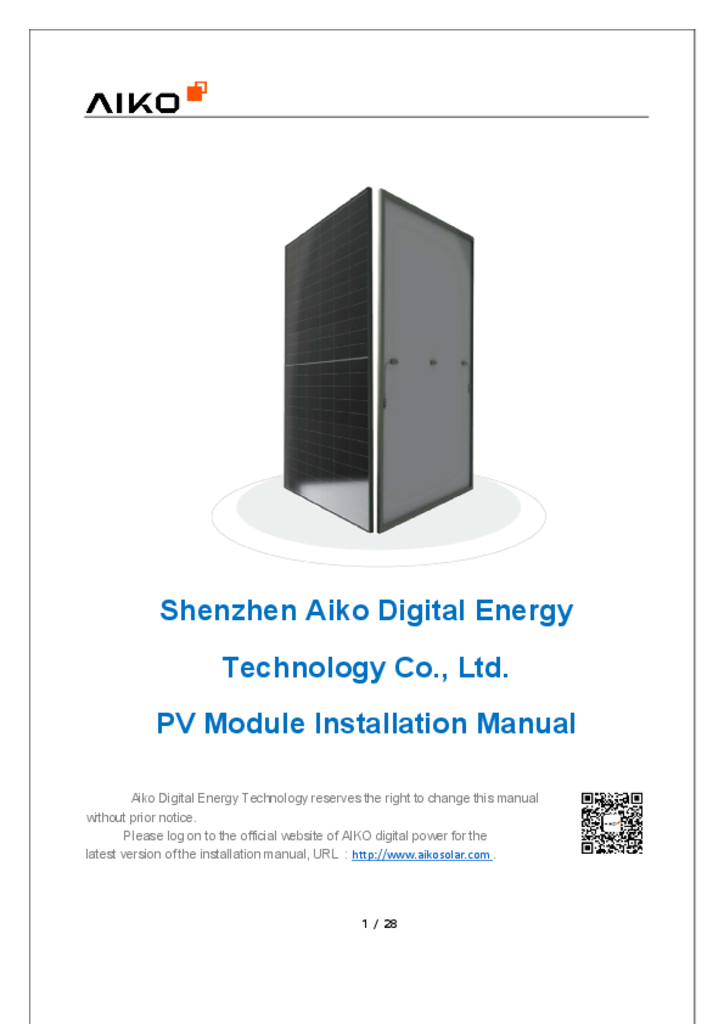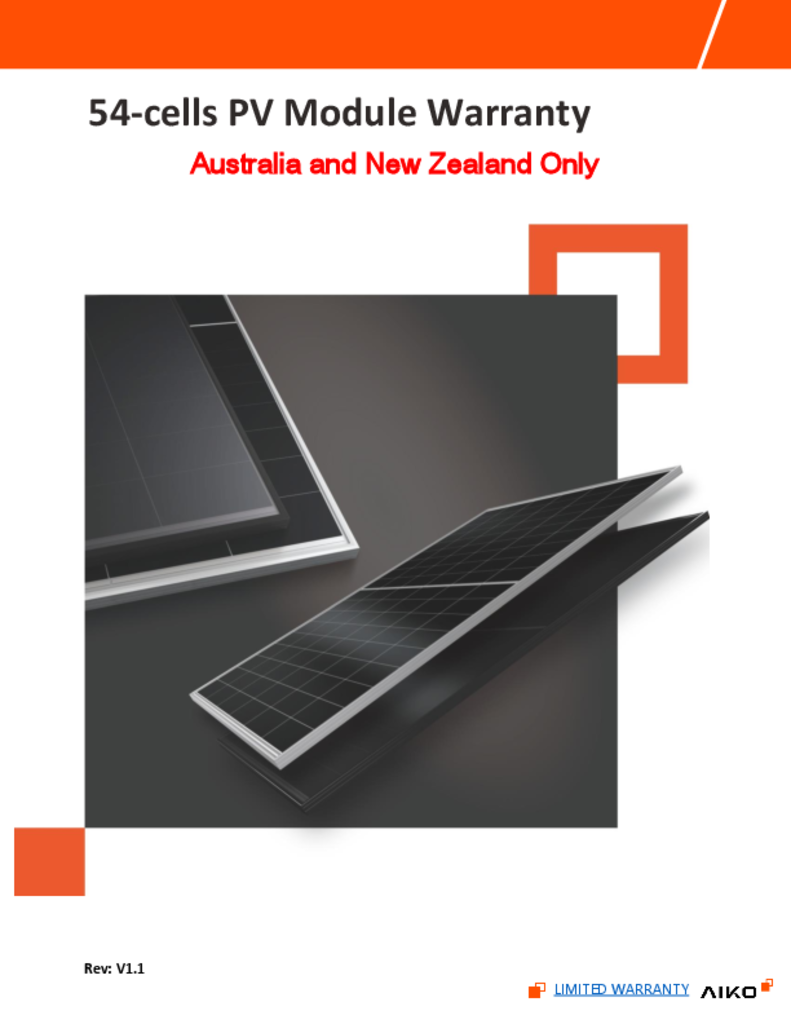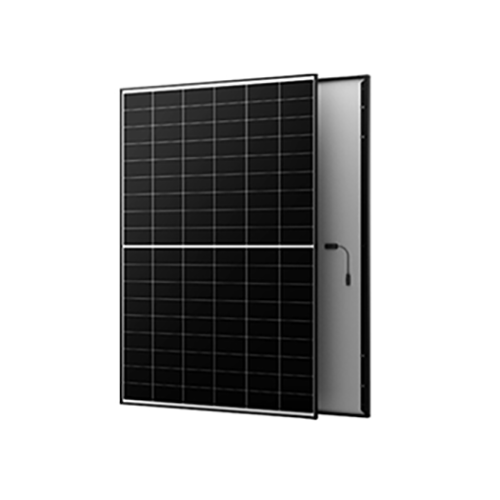
Aiko Neostar 2P 475W
GET A FREE QUOTE
QUICK REVIEW
The Aiko 475W Neostar 2P is a high-performance solar panel, equipped with cutting-edge cell optimisation technology.
Utilising N-Type ABC cells, it offers exceptional efficiency, improved durability, and maximised energy output, making it an excellent solution for residential and commercial solar applications.
Part number: AIKO-A475-MAH54Mw
Winner - Intersolar Award 2023
Winner - Red Dot Design Award 2023
Second Generation Comprehensive Upgrade:
Optimised for Partial Shading
Improved Temperature Coefficient
Enhanced High-Temperature Performance
Micro-Crack Resistance
Increased Power Output
Reduced Balance of System (BOS) Costs
Sleek Design with No Front Grid
The 'Neostar' module series offers a power range of 440-475 W, specifically designed for residential applications. Available in both mono (2N/2P/2S) and dual-glass (2S+) configurations, these modules deliver high power output within a compact footprint (1757 x 1134 mm; <2m²). With efficiency levels reaching up to 23.8%, the Neostar series combines superior performance with sleek, all-black aesthetics and enhanced roof safety features.
All Back Contact (ABC) Technology
AIKO Solar's All Back Contact (ABC) technology marks a breakthrough in photovoltaic cell design, significantly boosting both efficiency and aesthetics. By relocating all electrical contacts to the rear of the solar cells, ABC technology maximizes the surface area exposed to sunlight, enhancing energy conversion efficiency. This design reduces shading losses and optimizes light absorption, resulting in higher power output compared to conventional front-contact cells. The absence of front-side grid lines also improves the panels' appearance, making them ideal for residential and commercial installations where aesthetics are a priority. AIKO’s ABC technology highlights the company's dedication to innovation and sustainability in renewable energy solutions.
AIKO NEOSTAR N-Type ABC Module
The AIKO NEOSTAR N-Type ABC module is designed for residential solar systems, combining advanced All Back Contact (ABC) technology with high efficiency, durability, and aesthetic appeal, making it a top choice for residential energy solutions.
High Power Output
Delivering between 440 and 475W, the AIKO NEOSTAR module maximizes energy production through its cutting-edge cell technology, ensuring superior performance and contributing to overall system efficiency.
Optimised for Partial Shading
Engineered for optimal performance even in partial shade, the NEOSTAR module minimizes shading impact, ensuring consistent energy generation, making it suitable for installations in varied environments.
Sleek Matte Design
With its clean matte finish, the AIKO NEOSTAR module offers a sleek, modern aesthetic that enhances the look of any installation. It seamlessly integrates with contemporary architectural styles, making it a visually appealing option for Australian homes.
Enhanced Rooftop Safety
The AIKO NEOSTAR module prioritizes safety with improved features for rooftop installation and maintenance, ensuring reliable and secure operation throughout its lifespan.
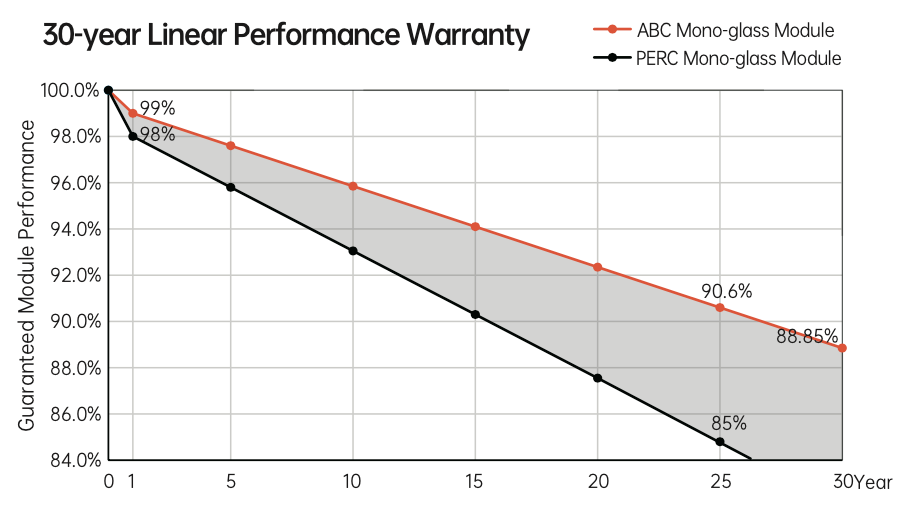
Testimonials
What they are saying about us
F.A.Q
Frequently Asked Questions
-
Is my rooftop solar system covered by warranty?
Yes it certainly is. Each panel type typically gets a 25 year performance warranty and at least a 10 year manufacturing warranty, depending on the panel chosen. Jinko panels offer a 10 year manufacturing warranty, QCells panels 12 years, and SunPower panels offer a 25 year manufacturing warranty (parts and labour).
Check out your panel and inverter warranty sheets for more details!
-
What are the benefits of rooftop solar power?
There are many benefits in installing a solar PV system including:
- Reduce or eliminate your power bill - you can regain control of your electricity costs.
- A revenue generating asset - you make back many times the initial cost of the system over the lifetime of your solar PV system.
- Add value to your home - a solar system adds value to your home increasing the resale value.
- Reduce your carbon footprint - a solar system generates no greenhouse gases while in operation giving you zero carbon power and lowing your overall carbon footprint.
- Reduce or eliminate your power bill - you can regain control of your electricity costs.
-
What rebates can I get with my rooftop solar system? And how much are they worth?
Solar rebates come in three forms:
- Federal rebates: i.e. Small-scale Technology Certificates (STC) which are available in all states.
- State based rebates: Available in some states from time to time and may be means tested (you can email info@pure-electric.com.au for more details).
- Feed in tariffs: Different tariffs are offered by different retailers.
Small-Scale Technology Certificate (STC) rebate
Currently, all solar systems are eligible for an STC rebate which is calculated using four factors.
Factor 1: The total size of your system in kW
i.e. you have a 10 kW of panels and an 8.2 kW inverter your system size is considered 10 kW
Factor 2: The Zone you are in
Australia is divided into four solar zones.
Zone Rating 1 1.622 2 1.536 3 1.382 4 1.185 To find out which zone your postcode is in click this link.
Factor 3: The STC multiplier based on the year in which you install your solar system
The STC multiplier is a factor worked out based on what year you install your solar system and is as follows:
Factor 4: The price of STCs
STCs can be priced through the Government's STC clearing house or on the open market at places like Green Energy Markets.
As an example say that you are installing 10 kW of panels, in Zone 1 in 2020 and the current price of an STC is $35 your STC rebate would then be:
STC rebate = 10 x 1.622 x 11 x 35 = $6,244.70
This would appear as a $6,244.70 discount off the total cost of your solar system.
State specific rebates and Feed in Tariffs (FiT)
If you want to find out the currently available up-front rebates or Feed in Tarrifs (i.e. the amount you are paid for feeding power back into the grid) you can always email us at info@pure-electric.com.au for more details.
The following is a list of state government entities that manage state based solar incentive schemes:
- VIC - See the following website: https://www.solar.vic.gov.au
- SA - See the following website: https://www.sa.gov.au/topics/energy-and-environment/energy-efficient-home-design/solar-photovoltaic-systems
- WA - See the following website: https://www.wa.gov.au/organisation/energy-policy-wa/energy-buyback-schemes
- QLD - See the following website: https://www.qld.gov.au/housing/buying-owning-home/energy-water-home/solar
- ACT - See the following website: https://www.actsmart.act.gov.au/energy-saving/rebatessubsidies
- NSW - See the following website: https://energysaver.nsw.gov.au/households/solar-and-battery-power
- Federal rebates: i.e. Small-scale Technology Certificates (STC) which are available in all states.
High Efficiency: Utilise ABC N-type technology to achieve maximum energy output from a compact area. Delivers 23.8% energy efficiency.
Exceptional Durability: Engineered with top-tier durability standards for long-term, reliable performance.
Sleek Aesthetics: The busbar-free, black-frame design offers a modern and seamless look for any rooftop.
Minimal Performance Degradation: Less than or equal to 1% in the first year, and ≤ 0.35% annually thereafter.
Premium Warranty: Includes a 25-year product warranty and a 30-year performance warranty, providing lasting peace of mind.
Enhanced Temperature Coefficient: -0.26% per °C for improved performance in varying temperatures.
Mechanical Specification
Cell Type | N-Type ABC |
Front Cover Mono glass | 3.2mm tempered glass |
Frame | Black anodised aluminum |
Cable | 4mm2(IEC) 12AWG(UL) 1200mm or Customised Length |
No. of Cells | 108(6*18) |
Junction Box | IP68,3 bypass diodes |
Connector | MC4 EVOA/MC4 EVO2 |
Weight | 21.5kg±3% |
Dimension | 1757*1134*30mm |
Package Detail | 36pcs per pallet/216 pcs per 20' GP/936pcs per 40' HQ |
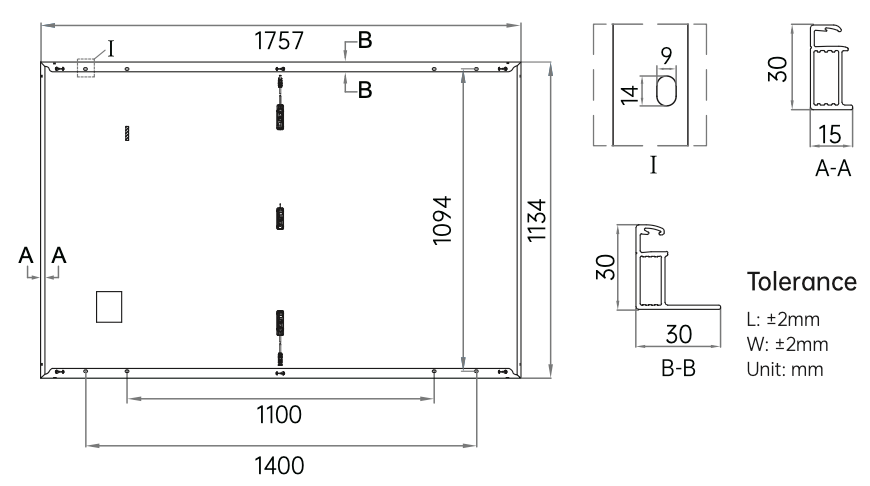
Electrical Characteristics
(STC: AM1.5 1000W/m2 25°C NOCT: AM1.5 800W/m2 20°C 1m/s. Power Tolerance: 0+3%)
Model | AIKO-A475-MAH54Mw | |
Test Conditions | STC | NOCT |
Pmax [W] | 475 | 358 |
Voc [V] | 41.24 | 38.94 |
Vmp [V] | 34.80 | 32.86 |
Isc [A] | 14.35 | 11.60 |
Imp [A] | 13.66 | 10.90 |
Module Efficiency | 23.8% | |
Temperature Ratings (STC)
Temperature Coefficient of Isc | + 0.05%/ °C |
Temperature Coefficient of Voc | - 0.22%/ °C |
Temperature Coefficient of Pmax | - 0.26%/ °C |
Installation Guide
Operation Temperature | -40°C - +85°C | |
Maximum Series Fuse Rating | 25A | |
Protection Class | Class II | |
Voc and Isc Tolerance | ±3% | |
Maximum System Voltage | DC1500V | |
Maximum Static Loading | Front 5400Pa | Back 2400Pa |
Hail Test | 25 mm diameter hail at 23 m/s | |
Fire Rating | IEC Class C | |
The PV modules must be regularly inspected and maintained, especially within the warranty period, which is the responsibility of the user. And notify AIKO' customer service personnel as soon as possible in case of any damage or other significant abnormalities of PV modules.
1. Clean
The power output of photovoltaic modules is related to the incident light intensity. Dust accumulation or other obstructions will reduce the power output of photovoltaic modules. The dirt on the PV module shall be cleaned in time.
As for cleaning frequency, it depends on the accumulation rate of dirt. If the PV module has enough inclination angle, the rainwater will clean the surface of the PV module, which can reduce the cleaning frequency.
It is recommended to use a sponge moistened with clean water to wipe the glass surface of photovoltaic modules. It is strictly prohibited to use cleaning agents containing acid or alkali to clean PV modules. It is forbidden to use brush and other tools with rough surface for cleaning.
It is recommended to clean PV modules in the early morning or evening when the light is weak and the temperature of PV modules is relatively low.
2. Visual inspection
Visually inspect the PV module for appearance defects, such as:
Whether the photovoltaic module glass is broken;
Whether the photovoltaic module backplane is cracked or otherwise abnormal;
Whether the junction box is damaged and whether the cable is damaged;
Whether the PV module is covered by foreign matters and shadows;
Check whether the bolts fixing PV module and bracket are loose or rusted, and adjust or replace them in time;
Check whether the PV module is well grounded.
3. Connector and cable inspection
It is recommended to carry out preventive inspection once every six months, such as:
Check the tightness of the connector and the firmness of the cable;
Check the junction box sealant for cracks.
